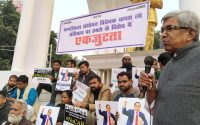$100 Website Offer
Get your personal website + domain for just $100.
Limited Time Offer!
Claim Your Website NowIndia needs more and more inter-faith marriages, and laws need to facilitate that
Source:-https://theprint.in
In a recent judgment, the Allahabad High Court observed that religious conversion for the purpose of marriage is unacceptable. The court cited its own 2014 judgment, which had reiterated the Supreme Court’s observation in the Lily Thomas vs Union of India case that conversion of a person to Islam can only be considered bona fide if he or she is a major, of sound mind, and is ready to embrace Islam by his or her free consent and the faith which he or she holds in Allah or Prophet Muhammad.
After this judgment, sensing vindication of their campaign against the so-called ‘love jihad‘, Uttar Pradesh Chief Minister Yogi Adityanath and other BJP leaders are now talking about an anti-conversion law for their states.
However, is there something wrong with Hindus and Muslims marrying each other?
I don’t think any person with a liberal view and an open mind would actually oppose inter-faith marriage. It is, after all, a personal choice. In fact, inter-faith marriages play an important role in socio-cultural assimilation of a community, and facilitate better integration in society.
In times like these, with ever-increasing polarisation and faultlines in societies, we need more and more of inter-faith marriages, which are also recognised as human rights under Article 16 of the Universal Declaration of Human Rights.
Personal laws obstruct personal choice
There have been instances where some men have concealed their religious identity before marrying women of other religions. However, these instances are sporadic and cannot be termed as a ‘conspiracy’ or ‘love jihad‘.
Should governments have a say in who we marry? At first glance, a sensible answer would be ‘no’.
Now, let me tweak this question a little bit. Should centuries-old, gender-biased, religious personal laws, based on morals of different times and spaces, influence or dictate our personal choices? Or should our choices be protected and guided by a modern, gender-neutral law? I know the answer and I know you know it too.
Let me give you an example — in 2019, the Supreme Court had observed that a marriage of a Hindu women with a Muslim man is not “regular or void” and the wife can’t inherit husband’s property. For certain, the government should have no role in personal choices of an individual; it should facilitate the fulfilment of their choices.
A good example of that would be the Special Marriages Act, which liberates individuals from traditional requirements of a religion. Similarly, personal laws should also be rectified and amended to ensure gender neutrality and fulfilment of human rights, as was done in case of Hindu Marriage Act, 1956. Unfortunately, it could not be replicated in case of other religions, particularly Islam, due to lack of political will.
What do statistics say about inter-faith marriages in India? First, state governments in India do not keep a separate record of inter-faith marriages. In 2005, the Indian Human Development Survey (IHDS), organised by the University of Maryland in the US and the National Council of Applied Economic Research (NCAER), noted that 2.21 per cent of all women between age of 15-49 had married outside their religion.
This is not a significant number and shows how personal laws influence, or rather obstruct, personal choices. It also shows how the Special Marriages Act is not as facilitating as it should be. It should be made simpler and provisions like issuing public notice one month before registration, which also includes the address of couple, should either be amended or done away with.
Instead of waiting for the court’s intervention, in my opinion, the government should move forward with either a piecemeal approach by reforming personal laws, like it did in the case of triple talaq, or it should build consensus and go for a uniform civil code — of course, with provisions for preservation of culture of tribal citizens.



